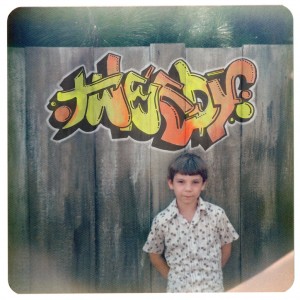
ANTI- / dBpm Records
When I saw Jeff Tweedy play at the Newport Folk Festival this past summer, something seemed markedly different about his appearance. He still has the face of someone who has seen too much, he’s still overweight, and certainly still sarcastic. But the Jeff Tweedy of 2014 wore something I’ve never seen him wear in any of the other handful of times I’ve seen him play: a smile. Maybe it’s because he has a new album that dropped Tuesday. More likely, it’s because Spencer Tweedy, his son, collaborates with him on it.
For those unfamiliar with the elder Tweedy’s music, his career begins long before Spencer was even born. Way back in 1987, Tweedy formed Uncle Tupelo with childhood friend Jar Farrar (now of Son Volt); they played a new brand of country eventually labelled “No Depression”, after a Carter family song they covered and the subsequent name of their first album. After Farrar and Tweedy split, Tweedy went on to form Wilco, which released its debut A.M. in 1995. Three albums, six years, and a label-merger debacle later, Wilco released their seminal record Yankee Hotel Foxtrot, an emotionally and sonically experimental project that was No. 3 in Rolling Stone’s Best Albums of the 2000s and No. 493 in its Best Albums of All Time (and No. 1 on Hunter Johns’ personal Best Albums of All Time). Since then, Wilco and Tweedy have journeyed back and forth between alt-country and noise and reaching commercial success for its Grammy-nominated The Whole Love which charted at #5. In his spare time, Tweedy produces for artists like soul great Mavis Staples and Chicago-based, Vic Mensa-led fusion act Kids These Days; barring these projects, Sukierae is Jeff Tweedy’s latest flagship release.
Going into this album, the question in my mind was exactly how similar Jeff Tweedy the solo artist would be to Jeff Tweedy the frontman for Wilco. The answer is nearly the same as the question: Jeff Tweedy the solo artist doesn’t have Wilco like Jeff Tweedy the frontman for Wilco does. Tweedy’s lack of the band is sometimes a blessing, allowing for a baring naked of his ideas and musicality, and at other times I’m left wishing for someone else in the studio to second-guess Tweedy (at least someone who isn’t his son). In particular, the seventh song “Pigeons” is a quieter, slower song than some of the other tracks on Sukierae; this is the type of song Wilco might have infected with some sort of craziness under the gentleness that lies on top, but without Wilco the song loses the craziness in favor of pure gentility. Conversely, songs like “Low Key”, the sixth song on Sukierae, retains those Jeff Tweedy melodies that Wilco fans have come to love, yet still bringing a roughness to the recording that I haven’t yet heard on a Wilco album. Still other tracks could be mistaken for Wilco songs, like the familiar progressions on “High As Hello” or the discordant guitar that’s reminiscent of Nels Kline’s recent work with Wilco on “I’ll Sing It”.
Another question I had about Sukierae was what, if anything, Jeff Tweedy’s son Spencer would contribute to the record. Most obviously, Spencer’s main contribution is his drumming on nearly all of the twenty songs that make up Sukierae. And truthfully, his drumming is pretty good to my ear. All of his beats are interesting, most of all the fourth track “Diamond Light Pt. 1.” But as good as Spencer’s drumming is, the pair’s decision to place the drums front and center on many of the songs tastes a little like Quentin Tarantino’s cameos in his own movies: were Tarantino not the director of the movie (and completely enamored of himself) or Spencer not Jeff’s son and one half of Tweedy, the role of either person in their respective projects would be less noticeable and consequentially less confusing to the audience. Past his drumming, it’s hard to know how much Spencer really brought to the project. He might well be responsible for all the things that make Sukierae different from a Wilco record; then again, he may have just shown up to play the drums.
On the whole, I think Sukierae achieves what it set out to achieve; it doesn’t bill itself as a concept album, or anything as complex as what Wilco usually does. Sukierae is Jeff Tweedy’s version of stripped down rock, a collection of songs carefully crafted but nonetheless spontaneous. I’m happy to hear what Tweedy’s inner mind sounds like all on its lonesome. If and when Wilco regroups for a new album, it’ll be nice to know what Jeff Tweedy can and cannot do by himself.
Label: ANTI- / dBpm Records
“Sukierae” on: iTunes – Amazon
Hunter Johns is a new Lightning Rod staff member writing about music and film. His album reviews are published Tuesdays.
